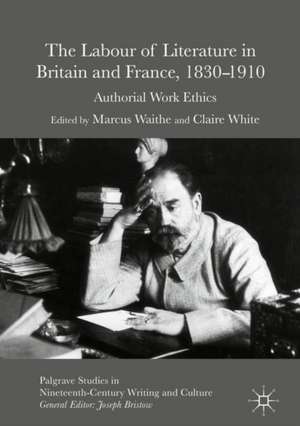The Labour of Literature in Britain and France, 1830-1910: Authorial Work Ethics: Palgrave Studies in Nineteenth-Century Writing and Culture
Editat de Marcus Waithe, Claire Whiteen Limba Engleză Hardback – 4 mai 2018
Din seria Palgrave Studies in Nineteenth-Century Writing and Culture
- 15%
 Preț: 584.43 lei
Preț: 584.43 lei - 20%
 Preț: 691.57 lei
Preț: 691.57 lei - 15%
 Preț: 646.30 lei
Preț: 646.30 lei -
 Preț: 390.63 lei
Preț: 390.63 lei -
 Preț: 390.63 lei
Preț: 390.63 lei - 15%
 Preț: 526.18 lei
Preț: 526.18 lei -
 Preț: 389.11 lei
Preț: 389.11 lei -
 Preț: 390.63 lei
Preț: 390.63 lei -
 Preț: 384.70 lei
Preț: 384.70 lei -
 Preț: 388.72 lei
Preț: 388.72 lei -
 Preț: 388.72 lei
Preț: 388.72 lei -
 Preț: 388.72 lei
Preț: 388.72 lei -
 Preț: 390.63 lei
Preț: 390.63 lei -
 Preț: 389.31 lei
Preț: 389.31 lei -
 Preț: 388.72 lei
Preț: 388.72 lei - 15%
 Preț: 700.75 lei
Preț: 700.75 lei - 18%
 Preț: 731.10 lei
Preț: 731.10 lei -
 Preț: 387.75 lei
Preț: 387.75 lei - 15%
 Preț: 651.51 lei
Preț: 651.51 lei -
 Preț: 390.63 lei
Preț: 390.63 lei -
 Preț: 390.63 lei
Preț: 390.63 lei -
 Preț: 386.81 lei
Preț: 386.81 lei -
 Preț: 387.75 lei
Preț: 387.75 lei -
 Preț: 392.97 lei
Preț: 392.97 lei -
 Preț: 389.11 lei
Preț: 389.11 lei -
 Preț: 389.88 lei
Preț: 389.88 lei - 15%
 Preț: 641.71 lei
Preț: 641.71 lei -
 Preț: 386.61 lei
Preț: 386.61 lei - 15%
 Preț: 584.43 lei
Preț: 584.43 lei -
 Preț: 392.60 lei
Preț: 392.60 lei -
 Preț: 390.84 lei
Preț: 390.84 lei - 15%
 Preț: 642.36 lei
Preț: 642.36 lei - 15%
 Preț: 582.80 lei
Preț: 582.80 lei - 15%
 Preț: 639.25 lei
Preț: 639.25 lei -
 Preț: 388.72 lei
Preț: 388.72 lei -
 Preț: 387.20 lei
Preț: 387.20 lei - 15%
 Preț: 642.51 lei
Preț: 642.51 lei -
 Preț: 384.31 lei
Preț: 384.31 lei -
 Preț: 387.75 lei
Preț: 387.75 lei -
 Preț: 389.70 lei
Preț: 389.70 lei -
 Preț: 386.81 lei
Preț: 386.81 lei
Preț: 586.55 lei
Preț vechi: 690.06 lei
-15% Nou
Puncte Express: 880
Preț estimativ în valută:
112.24€ • 117.72$ • 93.43£
112.24€ • 117.72$ • 93.43£
Carte tipărită la comandă
Livrare economică 01-15 aprilie
Preluare comenzi: 021 569.72.76
Specificații
ISBN-13: 9781137552525
ISBN-10: 1137552522
Pagini: 272
Ilustrații: XV, 268 p.
Dimensiuni: 148 x 210 x 24 mm
Greutate: 0.49 kg
Ediția:1st ed. 2018
Editura: Palgrave Macmillan UK
Colecția Palgrave Macmillan
Seria Palgrave Studies in Nineteenth-Century Writing and Culture
Locul publicării:London, United Kingdom
ISBN-10: 1137552522
Pagini: 272
Ilustrații: XV, 268 p.
Dimensiuni: 148 x 210 x 24 mm
Greutate: 0.49 kg
Ediția:1st ed. 2018
Editura: Palgrave Macmillan UK
Colecția Palgrave Macmillan
Seria Palgrave Studies in Nineteenth-Century Writing and Culture
Locul publicării:London, United Kingdom
Cuprins
1. Introduction: Literature and Labour - Marcus Waithe and Claire White.- 2. ‘[A] common and not a divided interest’: Literature and the Labour of Representation - Jan-Melissa Schramm.- 3. Collective Biography and Working-Class Authorship, 1830-1859- Richard Salmon.- 4. George Sand, Digging - Claire White.- 5. Ruskin, Browning / Alpenstock, Hatchet - Ross Wilson.- 6. Flaubert’s Cailloux: Hard Labour and the Beauty of Stones - Patrick M. Bray.- 7. Marian Evans, George Eliot, and the Work of Sententiousness - Ruth Livesey.- 8. Baudelaire and the Dilettante Work Ethic - Richard Hibbitt.- 9. ‘Strenuous Minds’: Walter Pater and the Labour of Aestheticism - Marcus Waithe.- 10. The Work of Imitation: Decadent Writing as Mimetic Labour - Matthew Potolksy.- 11. Literary Machines: George Gissing’s Lost Illusions - Edmund Birch.- 12. Worlds of Work and the Work of Words:Zola: Susan Harrow.- 13. Gender Difference and Cultural Labour in French Fiction from Zola to Colette: Nicholas White.- 14. Immaterial Labour and the Modernist Work of Literature - Morag Shiach.- 15. Epilogue: Work Ethics, Past and Present - Marcus Waithe and Claire White.
Recenzii
“It is only fitting that this outstanding collection points the way toward pleasurable labor that still remains to be done.” (Mark Allison, Victorian Studies, Vol. 62 (1), 2019)
Notă biografică
Marcus Waithe is a University Senior Lecturer and Fellow in English at Magdalene College, Cambridge, UK. His publications include William Morris’s Utopia of Strangers: Victorian Medievalism and the Ideal of Hospitality (2006) and (as co-editor), Thinking Through Style: Non-Fiction Prose of the Long Nineteenth Century (2018).
Claire White is a University Lecturer and Fellow in French at Girton College, Cambridge, UK. She is the author of Work and Leisure in Late Nineteenth-Century French Literature and Visual Culture: Time, Politics and Class (2014), and the co-editor of two journal numbers on Jules Laforgue and Émile Zola.
Claire White is a University Lecturer and Fellow in French at Girton College, Cambridge, UK. She is the author of Work and Leisure in Late Nineteenth-Century French Literature and Visual Culture: Time, Politics and Class (2014), and the co-editor of two journal numbers on Jules Laforgue and Émile Zola.
Caracteristici
Takes a cross-cultural approach by focusing on British and French cultures Responds to current concerns about the moral foundations of economic life Proposes a different periodisation based on questions of landmark moments in the history of political representation
